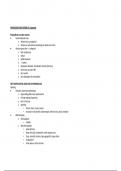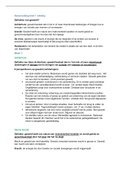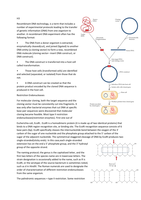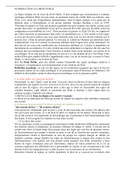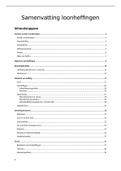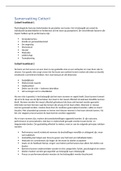The Scientific Foundations of Psychology
Philosophical Roots of Psychology
Early Philosophers: Plato and Aristotle debated the nature vs. nurture debate, exploring whether an
individual's knowledge and behavior were influenced by innate qualities or environmental factors. (Section
13)
Rene Descartes (1596-1650): A French philosopher who sought to answer life's fundamental questions. He
championed rationalism, emphasizing the use of reason and logic to uncover truth. Descartes believed that
senses could be deceptive and advocated for a mind-body dualism, proposing that the mind and body are
distinct entities. (Section 13)
Cartesian Dualism: Descartes's theory posits that the mind and body are separate but interact. The body
occupies physical space, is observable, measurable, and subject to doubt. The mind, however, exists
independently of physical space, cannot be directly observed or measured, and its existence is considered
indubitable. (Section 14)
John Locke (1632-1704): A British philosopher who disagreed with Descartes. He proposed empiricism,
suggesting that our understanding of the world is shaped through experiences and sensations. Locke's
emphasis on the environment's influence on the mind and behavior later influenced the behaviorism
movement. (Section 15)
The Rise of Experimental Psychology
19th Century Germany: German universities embraced Wissenschaft, a rigorous approach to education tha
emphasized scientific methods. This paved the way for applying physiological methods to study human
behavior. (Section 17)
Gustav Fechner (1801-1889): A physician with interests in physiology and psychology, Fechner developed
psychophysics, a field that explores the relationship between sensations and the physical stimuli that produce
them. He sought to quantify human behavior using experimental methods, laying the groundwork for
psychometrics and experimental psychology. (Section 17)
Wilhelm Wundt (1832-1920): Established the first psychology laboratory at the University of Leipzig in
1879. He focused on physiological psychology but believed that some phenomena could not be studied
experimentally, leading to his concept of Volkerpsychologie. (Section 21)
Wundt's Experimental Methods: Wundt employed structuralism, breaking down mental processes into
their basic elements. He used introspection, training individuals to objectively analyze their thoughts. He als
established the first journal of experimental psychology, "Philosophical Studies." (Section 23)
Darwin's Influence on Psychology
Charles Darwin (1809-1882): Published "The Origin of Species" in 1859, placing human nature within the
broader context of evolutionary change. Darwin's work emphasized evidence-based arguments and rigorous
observation, contributing to the scientific approach in psychology. (Section 25)
Functionalism: Darwin's work inspired functionalism, a school of thought that explores how human
Philosophical Roots of Psychology
Early Philosophers: Plato and Aristotle debated the nature vs. nurture debate, exploring whether an
individual's knowledge and behavior were influenced by innate qualities or environmental factors. (Section
13)
Rene Descartes (1596-1650): A French philosopher who sought to answer life's fundamental questions. He
championed rationalism, emphasizing the use of reason and logic to uncover truth. Descartes believed that
senses could be deceptive and advocated for a mind-body dualism, proposing that the mind and body are
distinct entities. (Section 13)
Cartesian Dualism: Descartes's theory posits that the mind and body are separate but interact. The body
occupies physical space, is observable, measurable, and subject to doubt. The mind, however, exists
independently of physical space, cannot be directly observed or measured, and its existence is considered
indubitable. (Section 14)
John Locke (1632-1704): A British philosopher who disagreed with Descartes. He proposed empiricism,
suggesting that our understanding of the world is shaped through experiences and sensations. Locke's
emphasis on the environment's influence on the mind and behavior later influenced the behaviorism
movement. (Section 15)
The Rise of Experimental Psychology
19th Century Germany: German universities embraced Wissenschaft, a rigorous approach to education tha
emphasized scientific methods. This paved the way for applying physiological methods to study human
behavior. (Section 17)
Gustav Fechner (1801-1889): A physician with interests in physiology and psychology, Fechner developed
psychophysics, a field that explores the relationship between sensations and the physical stimuli that produce
them. He sought to quantify human behavior using experimental methods, laying the groundwork for
psychometrics and experimental psychology. (Section 17)
Wilhelm Wundt (1832-1920): Established the first psychology laboratory at the University of Leipzig in
1879. He focused on physiological psychology but believed that some phenomena could not be studied
experimentally, leading to his concept of Volkerpsychologie. (Section 21)
Wundt's Experimental Methods: Wundt employed structuralism, breaking down mental processes into
their basic elements. He used introspection, training individuals to objectively analyze their thoughts. He als
established the first journal of experimental psychology, "Philosophical Studies." (Section 23)
Darwin's Influence on Psychology
Charles Darwin (1809-1882): Published "The Origin of Species" in 1859, placing human nature within the
broader context of evolutionary change. Darwin's work emphasized evidence-based arguments and rigorous
observation, contributing to the scientific approach in psychology. (Section 25)
Functionalism: Darwin's work inspired functionalism, a school of thought that explores how human


